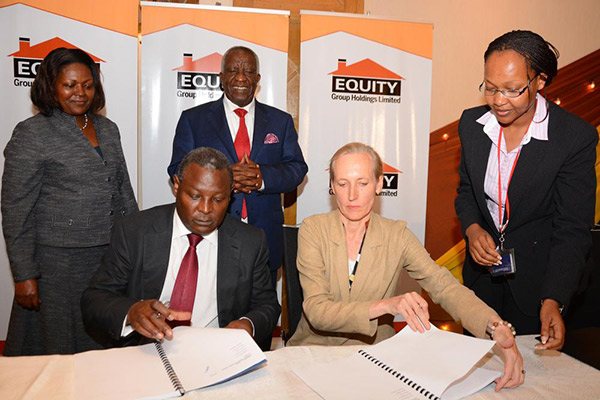The following opinion feature by investment analyst George Bodo was first published in the Business Daily.
Equity Bank’s purchase of a 79 per cent stake in ProCredit Bank DRC marks the end of ProCredit Holding’s presence in Sub-Saharan Africa (SSA). The Frankfurt-based financial holding group has now exited all its five African businesses.
In 2008, its Angolan business was sold to Banco de Investimentos. In May 2010, Ecobank Transnational Incorporated (ETI) acquired ProCredit’s business in Sierra Leone. In April 2014, ProCredit Holding sold all of its shares in Banco ProCredit Mozambique to ETI.
In October 2014, ProCredit Holding disposed of its shares in ProCredit Savings and Loans Company Ltd Ghana, representing 96 per cent of total capital, to Fidelity Bank Ghana Ltd.
It seems the business of providing loans to micro-enterprises in Africa is no longer a priority for the German financial conglomerate (however, the jury is still out on the real reasons why it is exiting SSA).
With the acquisition, Equity Bank now becomes the first Kenyan bank to open shop in the DRC. However, it is not a unique phenomenon to the DRC’s banking sector, which is already dominated by foreign banks.
Out of the 18 commercial banks currently operating in the country, only two are locally owned: Banque Commerciale du Congo or BCDC, which is majority-owned by the State, and Trust Merchant Bank—which is majority-owned by a local investor.
The remaining 16 banks are foreign majority-owned. Additionally, Equity now becomes the 10th pan-African financial group to establish operations in the DRC.
So just how viable is this acquisition? It will prove viable, only if Equity’s shareholders are willing to wait just a little longer. It’s definitely going to be the proverbial ‘fly trying to move the dung uphill’ story.
The DRC is a tough terrain and Equity is going to be navigating four unique and difficult variables.
First, the DRC is an informal economy and back-of-the-envelope calculations suggest that up to 80 per cent of the money supply is held outside the formal banking system.
Financial literacy levels remain very low and only four per cent of adults have a bank account with a formal financial institution. Equity’s own success story in Kenya has been driven by (i) a well financially informed bankable population; and (ii) a regulatory driven financial inclusion agenda. The Central Bank of Kenya has been very open to new innovations in the alternative delivery channels space.
Cleary, these two conditions aren’t entirely present in the DRC. Additionally, mobile money in the DRC is proving to be a hard nut to crack.
World Bank statistics show that in 2013 mobile cellular penetration rate in the DRC was 42 per cent, well below the SSA rate of 65 per cent.
There is clearly an opportunity here, but don’t be fooled; the telecommunications sector continues to suffer from poor infrastructure and high operational costs to the extent that the cost of sending money through mobile phones would be slightly higher than sending through money transfer organisations.
A study launched by GSMA in July 2013 showed 53 per cent of households sent or received remittances. It will take massive investments by telecoms operators for mobile money to be acceptable in the DRC. By contrast, in Kenya, the infrastructure is there and mobile money is highly acceptable.
Second, the DRC is a foreign currency-driven market, both on the funding and asset side. On the funding front, banks’ foreign currency deposit liabilities constitute an aggregate 86 per cent of their total deposit liabilities while on the asset side, 95 per cent of lending is in foreign currency, with US dollar (USD) lending constituting nearly the entire foreign currency loans basket.
It’s not yet clear how long it will take for Equity to fully rebrand all ProCredit outlets but as and when it does so, the excruciating battle to grow the retail deposit franchise afresh (and be able to attract low-cost USD deposits) will begin.
Back in Kenya, the market is local currency-driven and the bank has one of the strongest retail franchises.
Third, ProCredit’s profitability has been on a decline with return on shareholders’ equity declining from nine per cent in 2012 to five per cent in 2014 (mainly as a result of the increase in equity).
To reverse this trend, topline has to grow by double-digits and, to achieve such a growth quantum, Equity will have to strengthen its value proposition in the DRC that will include balance sheet strengthening, products update, systems upgrade and people alignment—all of which take some time and cost a lot of money (you just need to look at Uganda and Tanzania businesses).
Another reason why strengthening value proposition in the DRC will be important is because of the significant concentration levels: the top five banks control nearly 70 per cent of both assets and deposits.
Finally, the monster of non-performing loans. There is no national identification system in the DRC—neither is there robust credit referencing.
There is only one credit bureau, which apparently is housed inside the central bank and whose operations are still largely manual and widely viewed as ineffective, where only relatively few clients and mainly corporate clients with large loans are being included. In Kenya, all these are available.










